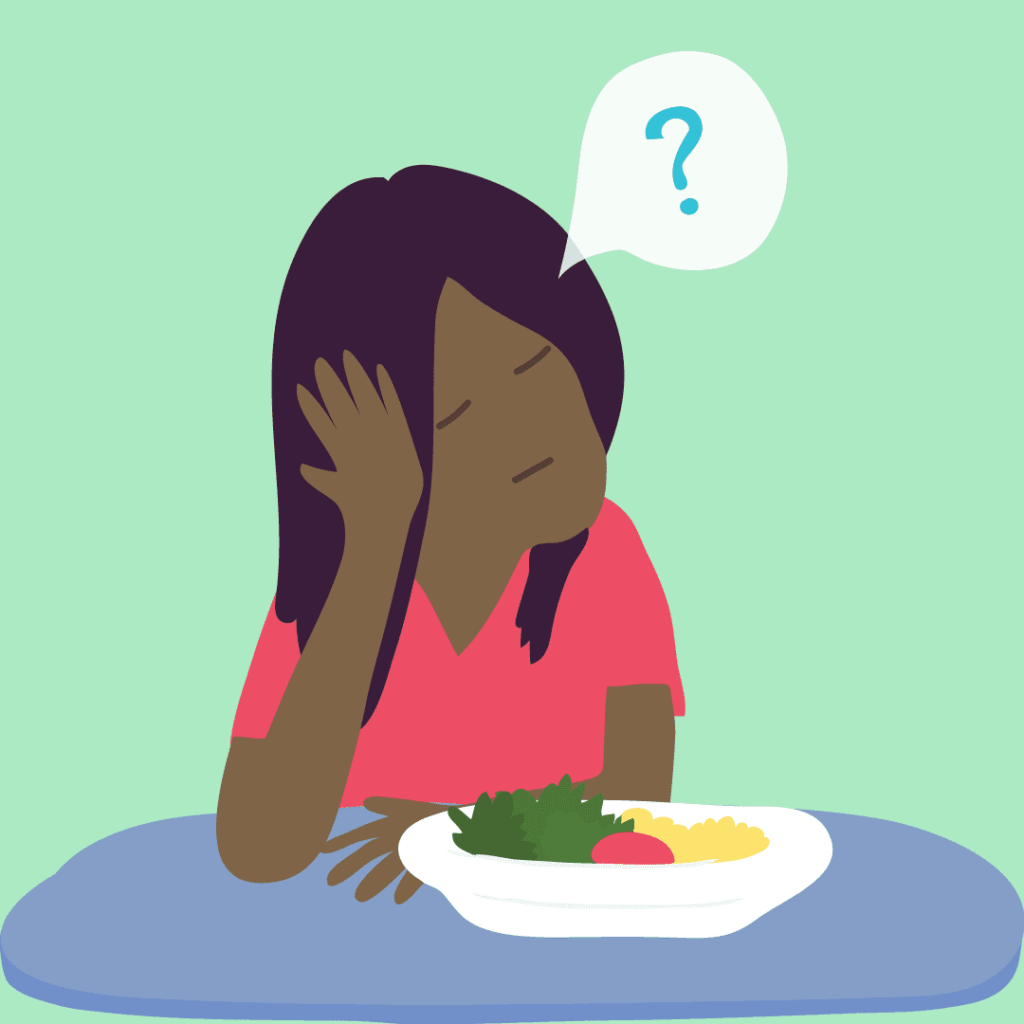If you’re like most people, you have probably heard of disordered eating but don’t really know what it is. Disordered eating is a pattern of abnormal eating habits that can lead to unhealthy weight loss or gain. It can be difficult to recognize disordered eating patterns because they can vary from person to person. In this blog post, we will discuss the signs and symptoms of disordered eating and provide tips on how to overcome them.
Contents
- 1 What Does ” Disordered Eating” Mean?
- 2 Types of Disordered Eating
- 3 Signs and Symptoms of Disordered Eating
- 4 Possible Causes of Disordered Eating
- 5 Negative Impacts of Disordered Eating
- 6 Diagnosis of Disordered Eating
- 7 Treatment of Disordered Eating
- 8 How To Prevent Disordered Eating?
- 9 How To Help Someone With Disordered Eating?
- 10 Conclusion
What Does ” Disordered Eating” Mean?
 Disordered eating means having an unhealthy relationship with food. This can manifest in a number of ways. This disorder also means that someone is obsessively thinking about food, their weight, and their body. This can lead to a preoccupation with dieting, calorie counting, and excessive exercise. It can also manifest as purging behaviors such as self-induced vomiting or laxative abuse. Disordered eating is often accompanied by feelings of shame, guilt, and isolation.
Disordered eating means having an unhealthy relationship with food. This can manifest in a number of ways. This disorder also means that someone is obsessively thinking about food, their weight, and their body. This can lead to a preoccupation with dieting, calorie counting, and excessive exercise. It can also manifest as purging behaviors such as self-induced vomiting or laxative abuse. Disordered eating is often accompanied by feelings of shame, guilt, and isolation.
Sometimes this disorder can also be referred to as an eating disorder not otherwise specified (EDNOS). This is when someone doesn’t fit the criteria for anorexia nervosa or bulimia nervosa, but they still have unhealthy eating habits.
If you think you might be struggling with disordered eating, it’s important to reach out for help. Disordered eating can lead to severe health complications and even death. If you are engaging in any of the behaviors listed above, please seek professional help immediately. There are many resources available to you, and recovery is possible.
Types of Disordered Eating

There can be many types of disordered eating that manifest in different ways. The three most common types are:
Anorexia Nervosa
This is when someone severely restricts their intake of food and calories to the point of starvation. Anorexics often have a distorted view of their body weight and shape, seeing themselves as overweight even when they are dangerously thin. This type is also characterized by an intense fear of gaining weight. This type of disordered eating is also a mental disorder that requires professional treatment.
Bulimia Nervosa
This is when someone engages in binging, or consuming large amounts of food in a short period of time, followed by purging. Purging can be done through self-induced vomiting, laxative abuse, or over-exercising. Bulimics often have a distorted view of their body weight and shape, seeing themselves as overweight even when they are dangerously thin. This type of disordered eating is also a mental disorder that requires professional treatment.
Binge Eating Disorder
This is when someone consumes large amounts of food in a short period of time without purging afterward. Binge eaters often feel out of control during a binge and feel ashamed and guilty afterward. This type of disordered eating is also a mental disorder that requires professional treatment. Binge eating disorder is the most common type of eating disorder all over the world.
Signs and Symptoms of Disordered Eating

There are many signs and symptoms of disordered eating, and they vary from person to person. However, there are some common signs and symptoms that may indicate that someone is struggling with disordered eating.
Some common signs and symptoms of disordered eating include:
Preoccupation with food, weight, and appearance
This is one of the signs of an eating disorder. If you or someone you know is always talking about food, weight, or appearance, it may be a sign of an unhealthy relationship with food. There may also be many food rules, such as only eating certain “healthy” foods or avoiding entire food groups.
Frequent dieting
This is another sign of an unhealthy relationship with food. If you or someone you know is always going on and off of diets, it may be a sign that there is a bigger issue at play. Dieting can often lead to bingeing and purging behaviors, as well as feelings of guilt and shame.
Excessive exercise
This is another sign of an unhealthy relationship with food. If you or someone you know is exercising excessively, it may be a way of compensating for calories consumed or a way to “burn off” food. This can often lead to injuries, as well as feeling exhausted all the time.
Skipping meals
This is another sign of an unhealthy relationship with food. If you or someone you know is skipping meals, it may be a way of restricting calorie intake. This can often lead to feeling lightheaded, dizzy, and weak. It can also make it difficult to concentrate and focus on tasks.
Eating in secret
This is another sign of an unhealthy relationship with food. If you or someone you know is eating in secret, it may be a way of hiding disordered eating behaviors from others. This can often lead to feeling ashamed and embarrassed about eating habits.
This is another sign of an unhealthy relationship with food. If you or someone you know is withdrawing from social activities, it may be because of body image issues or a fear of food. This can often lead to feeling isolated and alone.
Dieting and calorie counting to an extreme
If someone is fixated on their diet or is constantly counting calories, it may be a sign of disordered eating. This can also lead to dangerous behaviors such as skipping meals, restricting certain foods, or over-exercising.
Body dysmorphia
This is when someone has a distorted view of their body weight and shape. Someone with body dysmorphia may see themselves as overweight even when they are dangerously thin. This can lead to severe distress and can be a sign of an underlying eating disorder.
Extreme mood swings
Extreme mood swings can also be a sign of an underlying mental disorder. If you or someone you know is experiencing extreme mood swings, it may be a sign that there is something else going on.
Changes in sleeping habits
If you or someone you know is having difficulty sleeping, it may be a sign of an underlying mental disorder. Changes in sleeping habits can often be a sign of anxiety or depression.
Irritability and anxiety
If you or someone you know is feeling irritable or anxious, it may be a sign of an underlying mental disorder. These feelings can often lead to avoidance behaviors such as skipping meals or withdrawing from social activities.
Possible Causes of Disordered Eating

There are many possible causes of disordered eating, including psychological factors such as low self-esteem, anxiety, or depression. Other possible causes include a history of dieting or weight cycling, cultural pressure to be thin, and peer pressure. If you are concerned that you or someone you know may be struggling with disordered eating, it is important to be aware of the signs and symptoms.
Some of these causes are:
Low Self-Esteem
Low self-esteem is one of the main psychological causes of disordered eating. Individuals who struggle with low self-esteem often view food and their bodies in a negative light. They may see food as a source of comfort or as a way to cope with stress. This can lead to binge eating or other unhealthy eating habits.
Anxiety
Anxiety is another common psychological cause of disordered eating. Those who suffer from anxiety may turn to food as a way to cope with their anxiety symptoms. This can lead to restrictive eating or other unhealthy behaviors. There may also be a link between anxiety and binge eating.
Depression
Depression is another psychological factor that can contribute to disordered eating. aLSO, Depression can lead to changes in appetite and energy levels, which can result in weight loss or weight gain. It can also cause feelings of worthlessness and hopelessness, which may lead to unhealthy coping mechanisms such as binge eating.
A History of Dieting or Weight Cycling
A history of dieting or weight cycling is another possible cause of disordered eating. Dieting often leads to feelings of deprivation and frustration, which can trigger binging or other unhealthy behaviors. Weight cycling, or yo-yo dieting, can also be harmful to your health and may contribute to disordered eating.
Cultural Pressure to Be Thin
Cultural pressure to be thin is another possible cause of disordered eating. In our society, there is a lot of pressure to meet unrealistic standards of beauty. This can lead to body dissatisfaction and a preoccupation with food and weight. It can also lead to unhealthy dieting behaviors such as restriction, bingeing, or purging.
Peer Pressure
Peer pressure is often thought of as a negative force, but it can actually be a positive motivator. When it comes to disordered eating, peer pressure can be a driving force behind developing healthier habits. If you’re surrounded by people who are constantly dieting or talking about their weight, it’s easy to internalize those messages and start thinking that you need to lose weight too. But if you have friends or family members who are comfortable with their bodies and don’t obsess over food, you’re more likely to develop a healthy relationship with food as well.
There are many causes of disordered eating, but peer pressure is one of the most common. These causes can have a major impact on your body image and the way you think about food.
Negative Impacts of Disordered Eating
There are many negative impacts of disordered eating. Disordered eating can lead to weight gain or weight loss, which can, in turn, lead to health problems. Disordered eating can also lead to social isolation and a loss of interest in activities that were once enjoyed.
Some of these impacts are:
Dynamic Weight Loss
Weight loss is often one of the most noticeable impacts of disordered eating. While some people with disordered eating may be able to maintain their weight, others may yo-yo diet or binge eat and then purge. This can lead to a never-ending cycle of weight gain and loss that can be damaging to your health. Sometimes there may be also be a preoccupation with weight and appearance.
Mood Swings
Another impact of disordered eating is mood swings. People with disordered eating may experience irritability, anxiety, or depression. They may also have difficulty concentrating or sleeping. These mood swings can be caused by the physical effects of disordered eating, such as weight loss or malnutrition, or by the psychological effects, such as body dysmorphia.
Social Isolation
Disordered eating can also lead to social isolation. People with disordered eating may avoid social situations where food will be present, such as parties or restaurants. They may also withdraw from friends and family. This isolation can be caused by embarrassment about their eating habits or body image issues.
Loss of Interest in Activities
Another sign of disordered eating is a loss of interest in activities that were once enjoyed. This may be due to a lack of energy or motivation, or because the person is preoccupied with food and weight. Disordered eating can also lead to fatigue and low energy levels. It may also cause dizziness, lightheadedness, or fainting.
Digestive Issues
Digestive issues are one of the most common physical effects of disordered eating. This can include constipation, diarrhea, nausea, and vomiting. Disordered eating can also lead to dehydration, which can cause headaches, dry mouth, and fatigue. These digestive issues can be caused by a lack of nutrients, or by purging behaviors.
Constant Hunger
Some people with disordered eating may feel like they are constantly hungry. This can be due to a number of factors, including low blood sugar, malnutrition, or a lack of nutrients. It can also be caused by an imbalance in hormones. Constant hunger can lead to overeating or binge eating, which can then lead to purging behaviors.
If you or someone you know is displaying any of these signs, it may be time to seek help. Disordered eating is a serious issue that can have long-term consequences on your health and well-being. If you think you may be suffering from disordered eating, please talk to your doctor or mental health professional. There is help available, and recovery is possible.
Diagnosis of Disordered Eating
The diagnosis of disordered eating is not always clear-cut, and there is often a lot of overlap between different types of disordered eating. However, there are some general patterns that can be used to identify disordered eating.
There is no fixed method for the diagnosis of disordered eating. However, there are some general patterns that can be used to identify disordered eating. One common pattern is an obsession with food and weight. This can manifest as excessive preoccupation with calorie counting, restriction of food intake, and compulsive exercise.
Another common symptom is a distortion of body image. This can lead to a persistent feeling of being fat, even when at a healthy weight, or an unrealistic perception of one’s own body size and shape.
One should visit a professional doctor to get an official diagnosis, but these are some general patterns to help identify disordered eating. If you or someone you know is displaying these symptoms, it is important to seek professional help. Disordered eating is a serious condition that can have severe consequences if left untreated.
If you think you may be suffering from disordered eating, please contact a healthcare professional today. Recovery is possible with the right treatment and support.
Treatment of Disordered Eating

Treating disordered eating is very important, but can be difficult. There are many different types of treatments available, and finding the right one can be a process. The most important thing is to seek help from a professional who can help you understand your disorder and create a treatment plan that is right for you.
There are many different types of disordered eating, so there is no one-size-fits-all approach to treatment. Some of these are:
Medications
Medications are one option for treating disordered eating. They can be used to treat underlying mental health conditions, such as anxiety or depression. Medications can also prove to be a helpful way to manage compulsive behaviors. Some medications that can help to treat disordered eating include:
- Selective serotonin reuptake inhibitors (SSRIs)
- Serotonin and norepinephrine reuptake inhibitors (SNRIs)
- Tricyclic antidepressants (TCAs)
- Monoamine oxidase inhibitors (MAOIs)
Therapy
Therapy is another treatment option for disordered eating. It can be used to help identify the underlying causes of your disorder and develop healthy coping mechanisms. Therapy can be done individually or in a group setting.
Some people prefer therapy because it does not involve taking medication. Others find that a combination of medication and therapy is the most effective approach.
Nutrition Counseling
Nutrition counseling can be a helpful part of treatment for disordered eating. A registered dietitian can help you develop a healthy relationship with food and your body. They can also provide practical guidance on how to eat in a way that is both nutritious and satisfying. Nutritional counseling can also give it a try to help people who are struggling with compulsive exercise or body image issues.
Hospitalization
In some cases, hospitalization may be necessary to treat disordered eating. This is usually only recommended if there is a risk of serious health complications, such as severe malnutrition. Hospitalization can also be helpful if you are not responding to other forms of treatment.
If you or someone you know is struggling with disordered eating, please seek professional help. There are many resources available to those who need them. Recovery is possible with the right treatment and support.
How To Prevent Disordered Eating?

Preventing a disordered can be as simple as being more mindful of your eating habits and recognizing when you may be developing unhealthy patterns. Here are a few tips:
Be Aware of Your Meals
You should always be aware of what you’re eating and how much you’re consuming. This means being mindful of not only the types of foods you eat but also the portion sizes. Being aware of your meals will help you to better control your eating and make healthier choices.
Make Time for Meal Planning and Preparation
If you want to be in control of your eating, it’s important to take the time to plan and prepare your meals. This way you can make sure that you are eating healthy foods that are also satisfying. Meal planning and preparation can also help you to avoid making unhealthy impulsive decisions when it comes to food.
Identify Your Triggers
It’s important to identify the things that trigger disordered eating behaviors. Once you know what these triggers are, you can work on avoiding them or finding healthier ways to cope with them. Some common triggers include stress, boredom, anxiety, depression, and loneliness.
Seek Professional Help
If you think you may be developing disordered eating behaviors, it’s important to seek professional help. This is the best way to get an accurate diagnosis and develop a treatment plan that is right for you. Disordered eating is a serious problem that should not be ignored. With the right help, recovery is possible.
MantraCare is a platform that can help you to overcome disordered eating. MantraCare offers a variety of resources, including articles, blog posts, and podcasts, all of which are designed to help you on your journey to recovery.
If you or someone you know is struggling with disordered eating, please reach out for help. Recovery is possible.
How To Help Someone With Disordered Eating?
Helping someone with disordered eating can be difficult. You may want to help, but feel like you’re not sure how or what to do. Here are some tips:
Talk To Them
You should always try to talk to the person with disordered eating. This can be a difficult conversation, but it’s important to let them know that you’re there for them. You can also offer to help them find resources or treatment options. There maybe be some things that they’re not ready to talk about, but just letting them know that you’re there for them can be a big help.
Educate Yourself
It’s also important to educate yourself on disordered eating. This way you can better understand what the person is going through and how you can best help them. There are many resources available, such as books, websites, and articles. You can also talk to a professional if you have questions or concerns.
Be Supportive
The most important thing you can do is to be supportive. This means being there for the person, whether they want to talk about their disordered eating or not. It’s also important to listen without judgment and offer encouragement. Remember that recovery is possible and offer hope.
Respect Their Decisions
It’s important to respect the decisions that the person with disordered eating makes. If they don’t want to seek treatment or talk about their disorder, then you should respect their wishes. However, you can still offer your support and let them know that you’re there for them if they need anything.
Try To Be Understanding
Disordered eating can be a difficult thing to understand, but it’s important to try. This doesn’t mean that you have to agree with everything that the person does, but it does mean that you should try to see things from their perspective. This can be difficult, but it’s important to remember that everyone is different and there is no one right way to deal with disordered eating.
If you or someone you know is struggling with disordered eating, please reach out for help. Recovery is possible. MantraCare offers a variety of resources, including articles, blog posts, and podcasts, all of which are designed to help you on your journey to recovery.
Conclusion
Disordered eating is a serious problem that can have long-term consequences. If you think you may be struggling with disordered eating, it’s important to seek professional help. With treatment, you can overcome disordered eating and develop a healthy relationship with food.
There are many treatment options available for disordered eating. If you’re struggling with an eating disorder, reach out to a mental health professional to get started on the road to recovery. We have many resources to help you find the right treatment.
You can also contact us for more information about disordered eating disorders and how they can help you to cure your disorder. We are always happy to chat and answer any questions you may have. MantraCare is a therapy app that can be used to help you find inner peace and calm. It is available on the App Store and Google Play. Give it a try today! You may be surprised at just how much better you feel. Thanks for reading. You can also book a therapy or download our free Android or iOS app.


